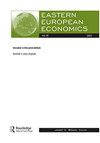基于自然语言处理的创业生命周期理论适用性比较
IF 1.2
4区 经济学
Q3 ECONOMICS
引用次数: 2
摘要
摘要在东欧和中欧经济体,初创企业有望成为经济发展的引擎。基于对创始人的采访,我们考察了创业生命周期理论(SLCT)可以在多大程度上被综合,以及可以绘制出哪些不同或相同的叙事概念空间。基于我们的自然语言处理结果,可以得出结论,在半周边国家的情况下,SLCT无法清晰地合成,因为它们绘制了不同的叙事空间。SLCT在初期可以充分捕捉企业,但在后期,理论的实际适用性降低。本文章由计算机程序翻译,如有差异,请以英文原文为准。
Comparison of Applicability of Startup Life Cycle Theories Based on Natural Language Processing
ABSTRACT In the economies of Eastern and Central Europe, startups are expected to become the engine of economic development. Based on interviews with the founders, we examine the extent to which startup life cycle theories (SLCT) can be synthesized and what different or identical narrative conceptual spaces can be drawn. Based on our natural language processing results, it can be concluded that SLCTs cannot be clearly synthesized in the case of semi-peripheral countries, as they draw different narrative spaces. SLCTs can adequately capture enterprises in the initial stages, but in the later stages, the practical applicability of the theories is reduced.
求助全文
通过发布文献求助,成功后即可免费获取论文全文。
去求助
来源期刊

Eastern European Economics
ECONOMICS-
CiteScore
2.20
自引率
9.10%
发文量
32
期刊介绍:
Eastern European Economics publishes original research on the newly emerging economies of Central and Eastern Europe, with coverage of the ongoing processes of transition to market economics in different countries, their integration into the broader European and global economies, and the ramifications of the 2008-9 financial crisis. An introduction by the journal"s editor adds context and expert insights on the articles presented in each issue.
 求助内容:
求助内容: 应助结果提醒方式:
应助结果提醒方式:


